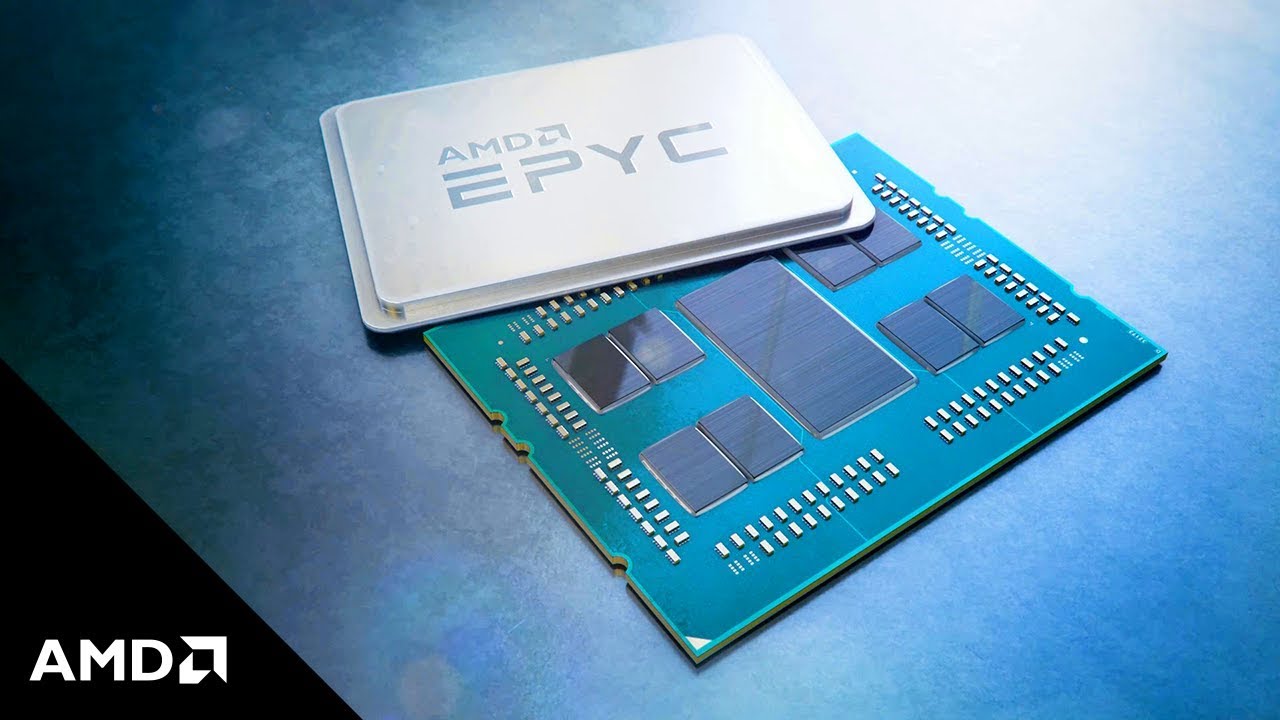AMD EPYC Rome 7742 Battles Intel Xeon in Benchmarks Posted Online
An anonymous source has submitted initial benchmarks of AMD's rumored 64-core, 128-thread EPYC 7742 processor to the publicly available OpenBenchmarking database. The posting has since been removed, but we managed to grab the test results.
AMD hasn't said much about this CPU line yet. AMD President and CEO Dr. Lisa Su revealed during AMD's Q2 2019 earnings call that the chipmaker will finally launch the core-heavy EPYC processors at a special San Francisco event on August 7. However, past leaks have pointed to possible details of various purported models.
If the recent benchmark postings are to be believed, the EPYC 7742 will have 64 cores and 128 threads and, therefore, would likely be the flagship model. The processor allegedly has up to 256MB of cache and comes with 225W. If the leaks are accurate, the 64-core monster will run at a 2.25 GHz base clock and 3.4 GHz boost clock. The deleted posting pitched the EPYC 7742 against AMD's own EPYC 7601 and Intel's existing Xeon Platinum 8280 and Xeon Gold 6138 chips.
| Model | Cores | Threads | Base Clock | Boost Clock | Cache | TDP |
| AMD EPYC 7742* | 64 | 128 | 2.25 GHz | 3.4 GHz | 256MB | 225W |
| AMD EPYC 7601 | 32 | 64 | 2.2 GHz | 3.4 GHz | 64MB | 180W |
| Intel Xeon Platinum 8280 | 28 | 56 | 2.7 GHz | 4.0 GHz | 38.5MB | 205W |
| Intel Xeon Gold 6138 | 20 | 40 | 2.0 GHz | 3.7 GHz | 27.5MB | 125W |
*Specifications in the table are unconfirmed
According to the test notes, the aforementioned processors were tested in both single-socket and dual-socket configurations on the Ubuntu 19.04 operating system with the latest Linux 5.2 kernel. The user also claimed to have applied all mitigations for each processor. While skimming through the different system configurations, we noticed that the memory speeds weren't consistent between test systems. They vary from DDR4-2666 to DDR4-2933, which would likely affect some of the benchmark results, especially those that are sensitive to memory speeds.
Although we couldn't verify the source, there are a plethora of results from different benchmark software. For the sake of simplicity, we picked the benchmarks that we use for our own enterprise-grade processor reviews and others that are the most common.
Remember, since neither these results nor the EPYC CPU have been confirmed, all these results should be taken with a heavy grain of salt.
Get Tom's Hardware's best news and in-depth reviews, straight to your inbox.
Encoding and Compression
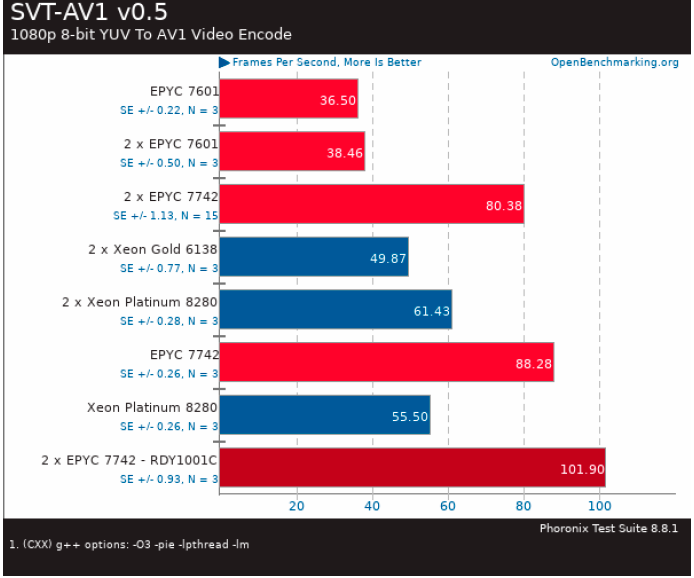
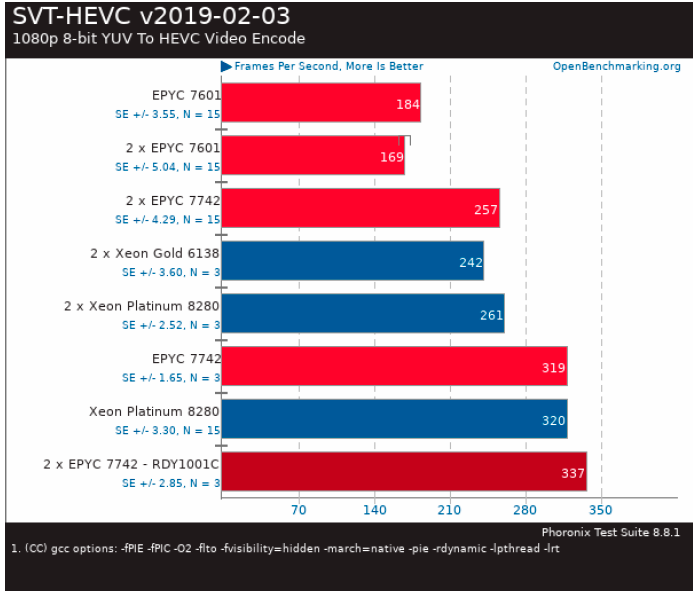
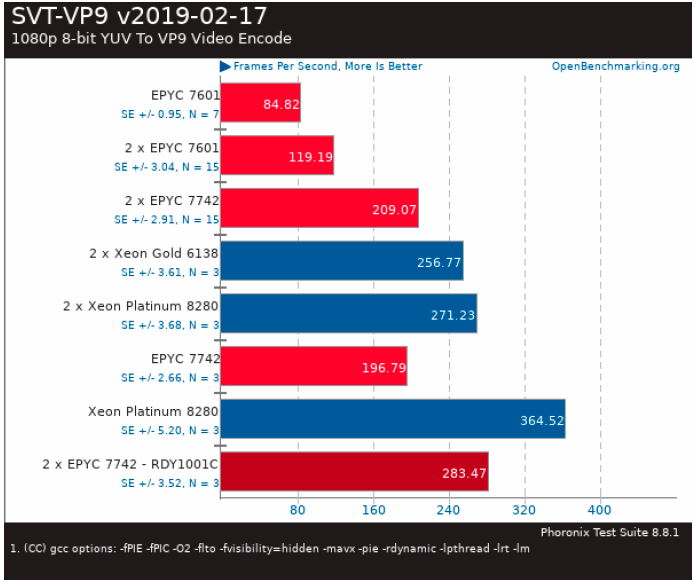
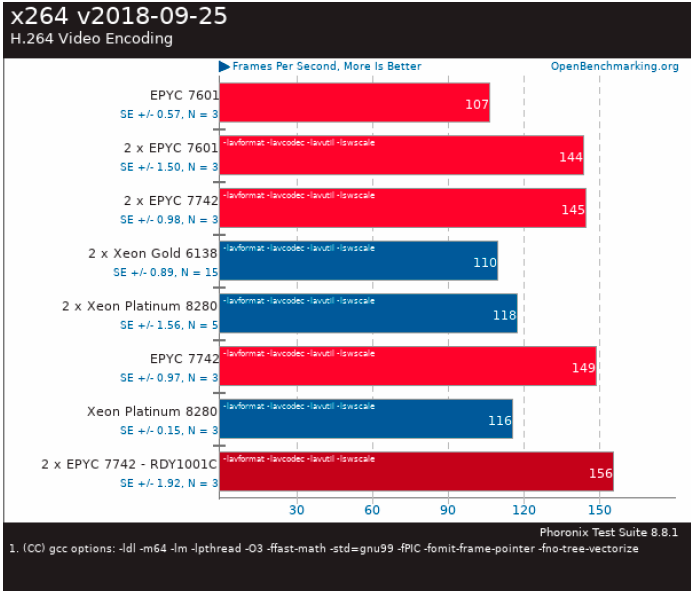
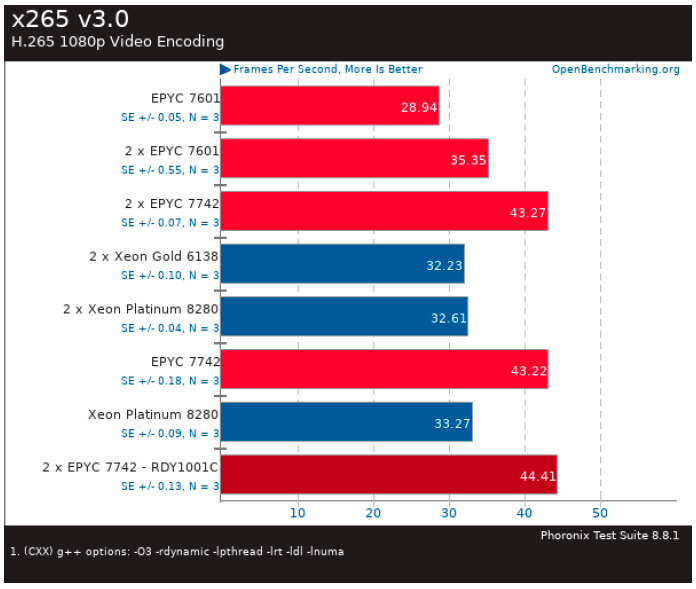
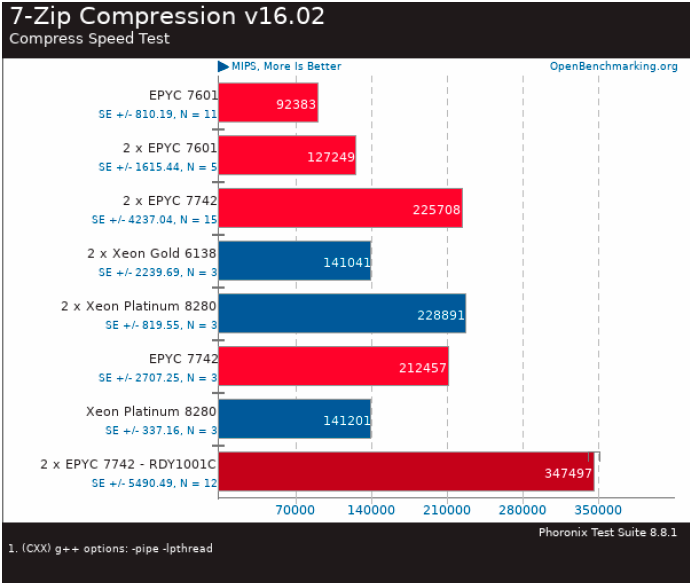
The Scalable Video Technology (SVT) is highly optimized for Intel Xeon chips, so Intel is expected to have the upperhand. However, it comes as a big surprise that the EPYC 7742 managed to beat the Xeon Platinum 8280 by up to 59.06% with the SVT-AV1 codec. As a matter of fact, the Xeon Platinum 8280 barely scored a victory over the EPYC 7742 on SVT-HEVC. Lastly, the SVT-VP9 brings out the best in Intel, as the Xeon Platinum 8280 glided past the EPYC 7742 by around 85.23%.
The EPYC 7742 seems to be a force to be reckoned with when the battle takes place on even ground. In the x264 benchmark, the EPYC 7742 beat the single and dual Xeon Platinum 8280s by 28.45% and 26.72%, respectively. Taking the fight to the x265 battleground, the EPYC 7742 continued to dominate with performance margins over 29%.
Programming and Compilation
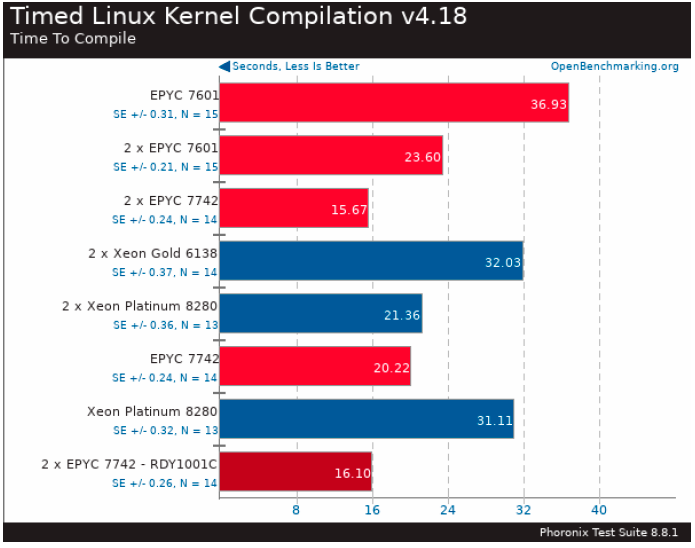
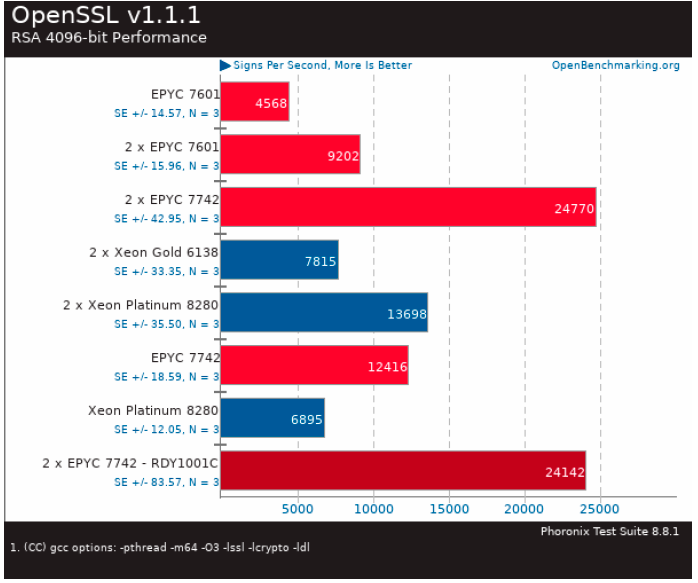
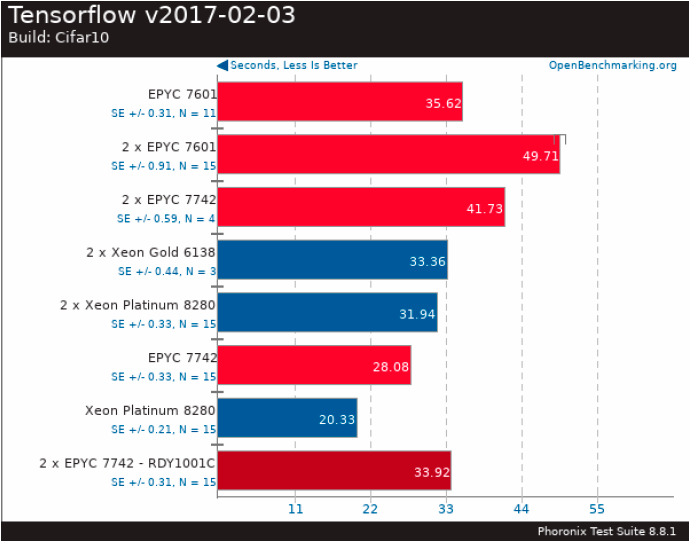
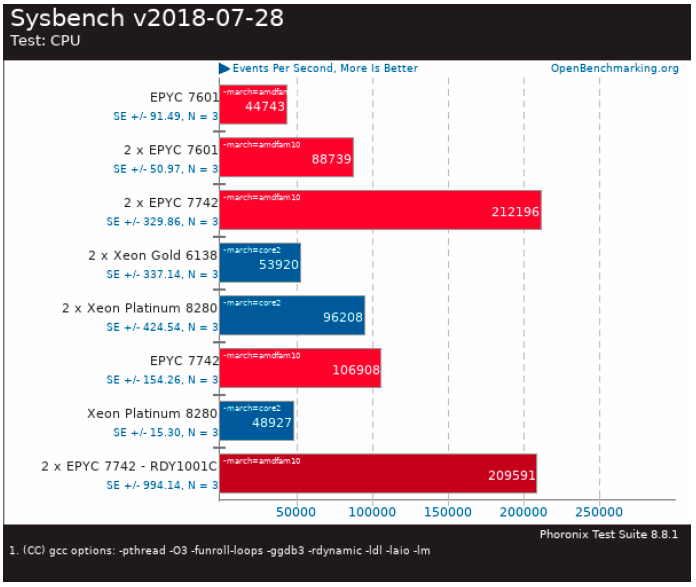
The EPYC 7742 allegedly built the Linux kernel up to 53.86% faster than a Xeon Platinum 8280 and up to 5.64% faster than dual Xeon Platinum 8280s. When it came to building the LLVM compiler, the EPYC 7742 reportedly did it up to 57.75% and 5.17% faster in comparison to single and dual Xeon Platinum 8280 chips, respectively.
The EPYC 7742 also shined in the OpenSSL, Tensorflow and Sysbench benchmarks.
Rendering
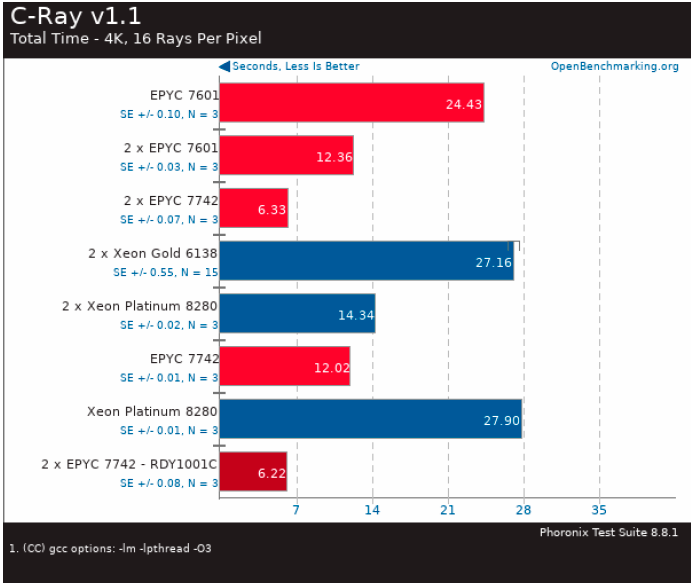
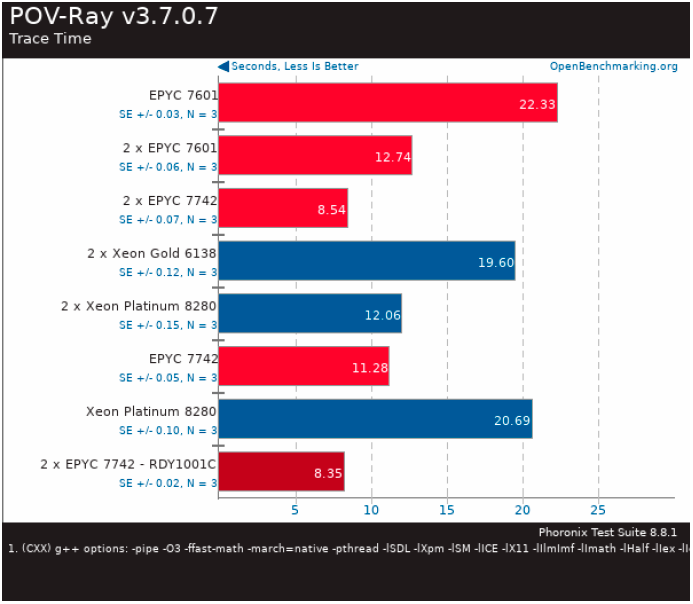
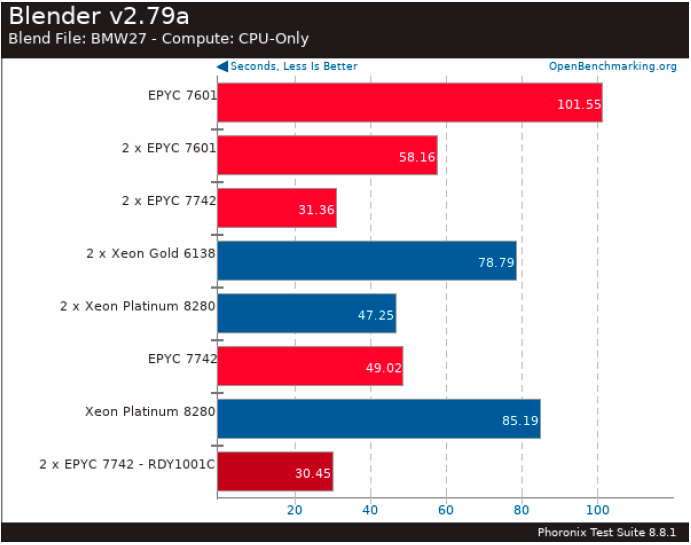
The EPYC 7742's alleged dominance continued to be seen in rendering workloads. The 64-core beast purportedly outperformed two Xeon Platinum 8280s by a margin of 19.3% and 6.9% in C-Ray and POV-Ray, respectively.

Zhiye Liu is a news editor, memory reviewer, and SSD tester at Tom’s Hardware. Although he loves everything that’s hardware, he has a soft spot for CPUs, GPUs, and RAM.
-
msroadkill612 I am inexpert, but it seems a very bad look for intel...a sound defeat with some vulnerable legacy software moats still in effect.Reply
But it is only part of the story, and the rest is much worse afaik.
Lanes, bandwidth, memory size, power?, density....
Ironically, a rare exciting technology they DO have - Optane, is better suited to lane/memory rich Epyc. -
thegriff Won't comment or question performance other than looking at the power of 225 Watts, I question that, just compared to the 32 Core AMD CPU, it has twice the CPU's 4x the memory and higher base frequency and it uses only 20 Watts more? That I question!!!!Reply -
Growle THAT is one serious CPU, holy crap. I absolutely don't need it for anything, but I would LOVE to build a system around that beauty.Reply -
redgarl Nothing short of impressive. The thing is Intel cannot produce a 64 cores chip, so trying to spin anything with the numbers in Intel favor is irrelevant.Reply -
redgarl ReplyGrowle said:THAT is one serious CPU, holy crap. I absolutely don't need it for anything, but I would LOVE to build a system around that beauty.
That's a server chip... why would you need this? You need the compute for your own AI pet project? -
crysis2 Reply
guess he already said he has no usage for such cpu!redgarl said:That's a server chip... why would you need this? You need the compute for your own AI pet project?
well at twice and even more core it has done nothing impressive(don't get me wrong all those benchmark results are impressive but it is exactly what you expect from a 64 core /128 thread cpu!)msroadkill612 said:I am inexpert, but it seems a very bad look for intel...a sound defeat with some vulnerable legacy software moats still in effect.
But it is only part of the story, and the rest is much worse afaik.
Lanes, bandwidth, memory size, power?, density....
Ironically, a rare exciting technology they DO have - Optane, is better suited to lane/memory rich Epyc.
Also waiting for IBM power 9 22 core 176 thread CPU! -
Growle Replyredgarl said:That's a server chip... why would you need this? You need the compute for your own AI pet project?
Yeah like I said, I have no need for it whatsoever! Though it would be nice to build a pc for machine learning and see how well it does. -
crysis2 Reply
Or you could build one around intel 56 core /112 thread new cpu(if i could afford it i'll do it)Growle said:Yeah like I said, I have no need for it whatsoever! Though it would be nice to build a pc for machine learning and see how well it does. -
Niva Replyredgarl said:That's a server chip... why would you need this? You need the compute for your own AI pet project?
There are a number of folks who CAN use a chip like this. Anyone doing any sort of rendering, data processing, or analysis work that can utilize multiple cores will benefit from such a chip. Believe it or not, some people also run servers from their home or businesses.
